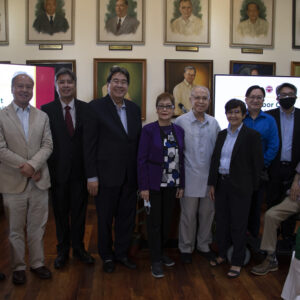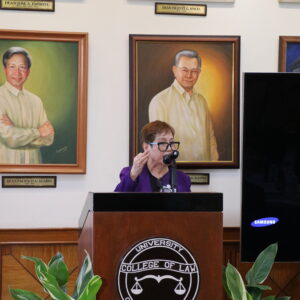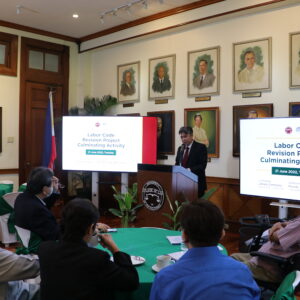Labor Code Revision Project Culminating Activity
Last June 21, 2022, the Labor Code Revision Project, chaired by Prof. Patricia R.P. Salvador Daway in partnership with the UP Institute of Government and Law Reform (UP IGLR), culminated in the formal presentation of the proposed Revised Labor Code of the Philippines, to the UP College of Law Dean Edgardo Carlo L. Vistan II. Dean Vistan commended the completion of the project. He saluted the members of the committee who toiled hours for the past several years. Hon. Rufus B. Rodriguez of the House of Representatives also attended the event and shared his enthusiasm in sponsoring the revised Labor Code as a bill to be filed in Congress. The event was also graced by the different members of the academe, a representative from the office of Senator Joel Villanueva, and representatives from other agencies of the government.
The event bookended about seven years’ worth of consultations and meetings between the members of the Revision Committee and the different sector representatives in an effort to further strike a balance between the interests of workers and employers. The UP IGLR assisted as Secretariat under the guidance of initially, Prof Nicholas Ty, and then, Prof Solomon Lumba.
Prof Daway summarized the salient points of the proposed codification and revision of the Labor Code of the Philippines. She also looked back on the creation of the Committee in 2014. Despite some hurdles in the initial creation of the Committee, the said Committee was reconstituted in 2016 with renewed spirit to make the much-needed amendments to the Labor Code. From then on, the Committee worked passionately in making the proposed revision. She acknowledged and thanked Dean Bartolome Carale, Atty. Ismael Khan, Dean Antonio Abad, Jr., Prof Francis Sobreviñas, Prof Evelyn (Leo) Battad, Prof Michelle Buenaventura-Dy, Prof Arnold De Vera, Prof Marwil Llasos for their invaluable contributions in the work of the Committee. She also acknowledged the original members of the Committee in 2014: Justice Vicente Veloso, Dean Carale, Dean Abad, Atty. Khan, Prof. Sobreviñas, Prof Battad, and Prof. Llasos.
Prof Daway discussed the difficulty in finalzing the revised version, as there are a lot of conflicting interests between labor and capital which needed to be reconciled. While there are provisions affording full protection to labor and promoting its welfare, the Constitution also encourages the promotion of private enterprises. She cited Article XIII of the 1987 Constitution aptly entitled “Social Justice and Human Rights”, which was referred to by Justice Cecilia Muñoz-Palma as the heart of the Philippine Constitution, as it addresses the most vulnerable sectors in our society which include the labor sector.
Prof Daway also mentioned that there are provisions in the revised version which are longer than the current provisions as the Committee included procedural matters which are merely provided in the implementing rules and regulations. Moreover, the Committee proposes the creation of the Court of Labor Relations (CLR), in place of the National Labor Relations Commission (NLRC). Further, the proposed revision added an eight book relating to gender rights consistent with pertinent new laws.
She capped off the event by highlighting the next step—which is to turn this codified work into policy—saying, “Huwag po tayong matakot ipaglaban ito, kasi ito ang magbibigay ng tunay na hustisya, higit sa lahat para sa ating mga manggagawa na matagal ng naghihirap.”










































































































 on the upper right corner to select a video.
on the upper right corner to select a video.